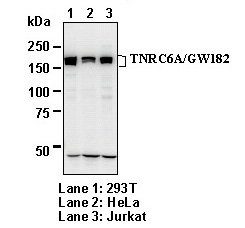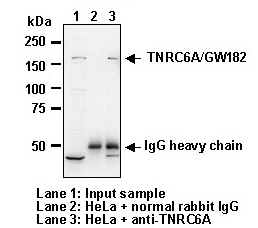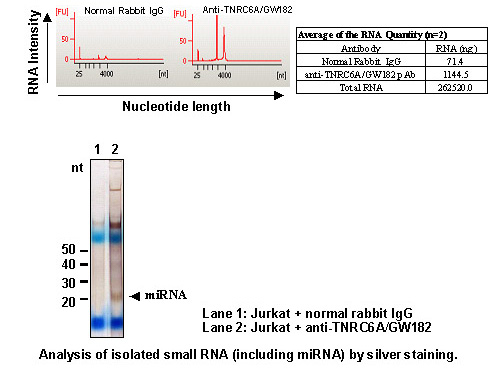This site is for customers in Asia.
Customers in China & other regions, please go to Global page.
HOME >
Product search results > Code No. RN033P
Anti-TNRC6A (GW182) (Human) pAb
Availability (in Japan)
10 or more
(In Japan at 00:05,
Apr 24, 2024 in JST)
Size
200 µL (1 mg/mL)
| Data | |||||
|---|---|---|---|---|---|
| Clonality | Polyclonal | Clone | Polyclonal | ||
| Isotype (Immunized Animal) | Rabbit Ig (aff.) | ||||
| Applications | |||||
| Immunogen (Antigen) | KLH conjugated synthetic peptide, corresponding to internal region of human TNRC6A | ||||
| Reactivity [Gene ID] | Human[27327], Mouse(-), Rat(-) |
||||
| Storage buffer | 1 mg/mL in PBS/50% glycerol, pH 7.2 | ||||
| Storage temp. | -20°C | Conjugate | Unlabeled | Manufacturer | MBL |
| Alternative names | GW1, TNRC6, CAGH26 | ||||
| Background | The trinucleotide repeat containing 6A (TNRC6A), also known as GW182, was so named because of its molecular weight and the presence of multiple glycine (G)–tryptophan (W) amino acid pairs in the N-terminal region that is required for interaction with Argonaute proteins. GW182 is a critical component of cytoplasmic processing bodies (P-bodies), which have been shown to function in mRNA degradation, storage, and miRNA-mediated gene silencing. The interaction of GW182 with Argonautes is required for P-body localization and may be critical for miRNA-mediated translational repression, because it induces the formation of the complexes containing miRNA–target mRNA. Further, the phosphorylated form of human TNRC6A has been shown to play a role in miRNA mediated gene silencing. | ||||
| Related products | RN1005 RIP-Assay Kit for microRNA RN003M Anti-EIF2C2 (AGO2) (Human) mAb RN058PW Anti-TARBP2 pAb PD009 Anti-rck (p54) pAb |
||||
| Citations |
Western Blotting
Immunocytochemistry
RNP Immunoprecipitation
Other(eCLIP)
|
||||
| Product category |
|
||||
- The availability is based on the information in Japan at 00:05, Apr 24, 2024 in JST.
- The special price is shown in red color.
- Please note that products cannot be ordered from this website. To purchase the items listed in this website, please contact us or local distributers.
- Abbreviations for applications:
WB: Western Blotting, IH: Immunohistochemistry, IC: Immunocytochemistry, IP: Immunoprecipitation
FCM: Flow Cytometry, NT: Neutralization, IF: Immunofluorescence, RIP: RNP Immunoprecipitation
ChIP: Chromatin Immunoprecipitation, CoIP: Co-Immunoprecipitation - For applications and reactivity:
*: The use is reported in a research article (Not tested by MBL). Please check the data sheet for detailed information.
**: The use is reported from the licenser (Under evaluation or not tested by MBL).
- For storage temparature: RT: room temparature
- Please note that products in this website might be changed or discontinued without notification in advance for quality improvement.












 Citations
Citations Data Sheet
Data Sheet




